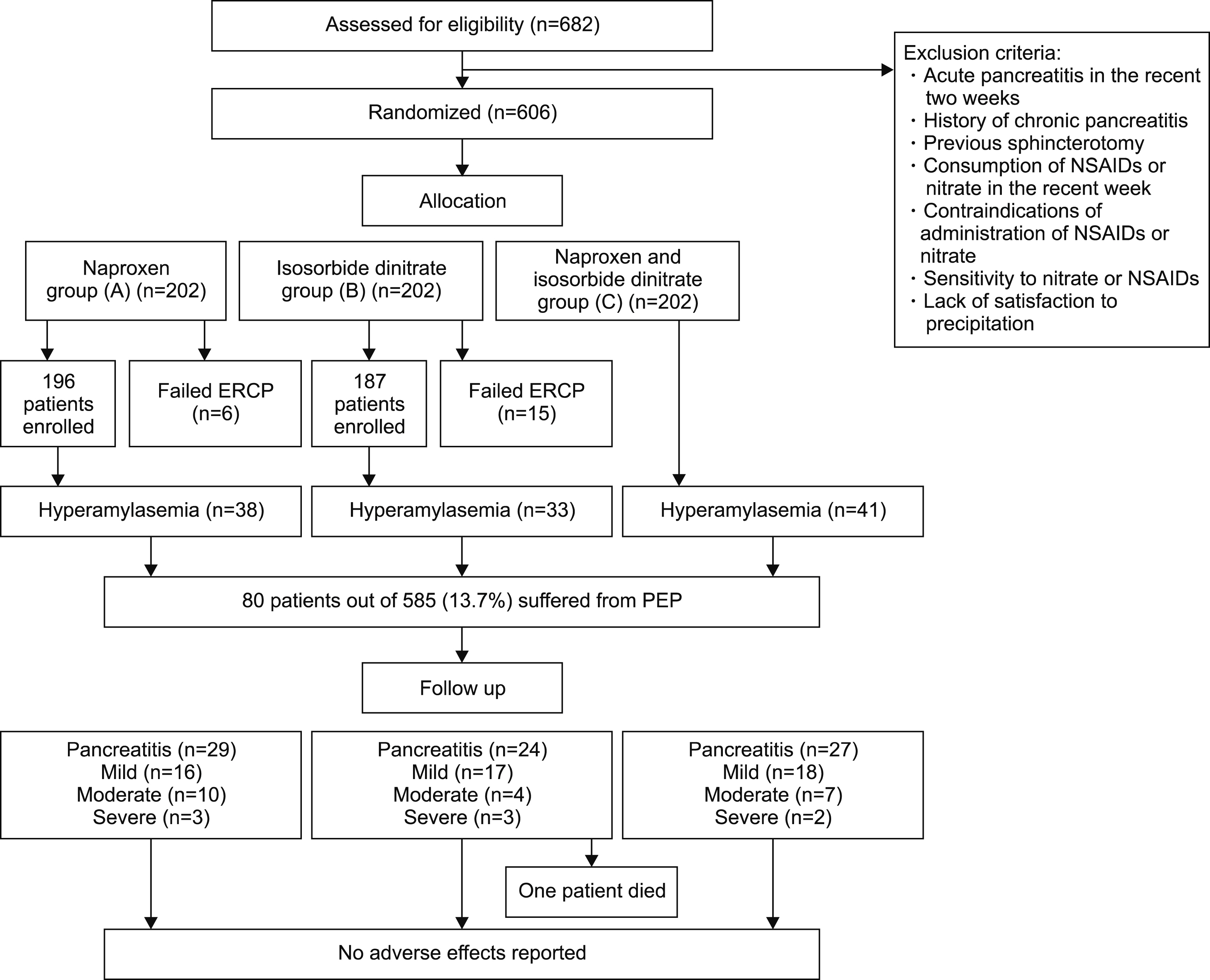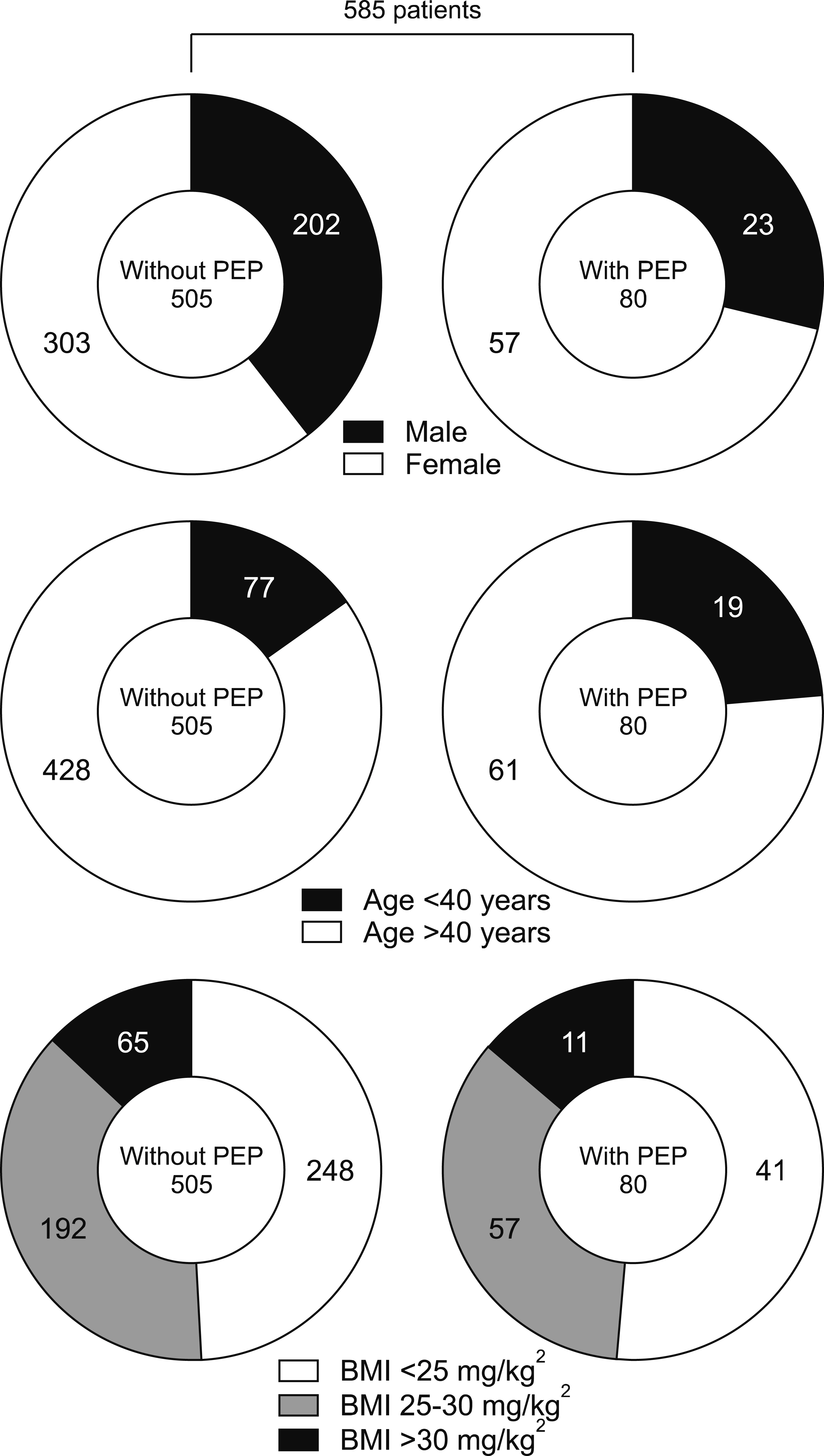Ann Hepatobiliary Pancreat Surg.
2020 Aug;24(3):259-268. 10.14701/ahbps.2020.24.3.259.
Naproxen, isosorbide dinitrate and co-administration cannot prevent post-endoscopic retrograde cholangiopancreatography pancreatitis: Randomized controlled trial
- Affiliations
-
- 1GI Cancer Screening and Prevention Research Center
- 2Caspian Digestive Disease Research Center
- 3Gastrointestinal and Liver Diseases Research Center, Guilan University of Medical Sciences, Rasht, Iran,
- 4New Iberia Research Center, University of Louisiana, Lafayette, LA, USA
- KMID: 2505338
- DOI: http://doi.org/10.14701/ahbps.2020.24.3.259
Abstract
- Backgrounds/Aims
Acute pancreatitis is the most widespread complication of endoscopic retrograde cholangiopancreatography.Here, we investigated the efficacy of rectal suppository naproxen, sublingual isosorbide dinitrate and their co-administration in the prevention of post-ERCP pancreatitis.
Methods
This double-blind randomized clinical trial carried out from June 2015 to February 2016 at the Gastrointestinal and Liver Diseases Research Center in Rasht, Iran. A total of 585 patients were selected from candidates for diagnostic or therapeutic ERCP by using the simple sampling method. Patients divided into three groups. Group A received 500 mg naproxen, group B took 5 mg isosorbide dinitrate, and group C was co-administrated both agents before ERCP. The primary outcome measure was the development of pancreatitis onset of pain in the upper abdomen and increase of serum amylase activity more than 3 times over the upper normal limit (60-100 IU/L) within first the 24 h post-ERCP.
Results
Totally, 80 patients developed PEP included 29 (4.9%), 24 (4.1%), and 27 (4.6%) patients in groups A, B, and C, respectively (p=0.845). Longer ERCP time (p=0.041), using diazepam (p=0.033), a higher number of pancreatic ducts cannulation (p<0.001),pancreatic duct injection (p=0.013), and using pancreatic stent (p=0.004) were the predisposing factors for PEP. Conclusions: Our findings indicated that prophylactic naproxen suppository or isosorbide dinitrate sublingually or co-administration had no significant difference in the prevention and severity of PEP, however, enhancing the endoscopist’s skills can be effective. Departments and educational hospitals should develop their assessment and quality assurance measures for the training of fellows’ not only technical training but also an understanding of the diagnostic and therapeutic roles of the procedure.
Keyword
Figure
Reference
-
1. Taghavi SA, Majd SK, Sianati M, Sepehrimanesh M. 2016; Prevalence of IgG-4-associated cholangiopathy based on serum IgG-4 levels in patients with primary sclerosing cholangitis and its relationship with inflammatory bowel disease. Turk J Gastroenterol. 27:547–552. DOI: 10.5152/tjg.2016.16344. PMID: 27852547.
Article2. Bai Y, Liu Y, Jia L, Jiang H, Ji M, Lv N, et al. 2007; Severe acute pancreatitis in China: etiology and mortality in 1976 patients. Pancreas. 35:232–237. DOI: 10.1097/MPA.0b013e3180654d20. PMID: 17895843.3. Woods KE, Willingham FF. 2010; Endoscopic retrograde cholangiopancreatography associated pancreatitis: a 15-year review. World J Gastrointest Endosc. 2:165–178. DOI: 10.4253/wjge.v2.i5.165. PMID: 21160744. PMCID: PMC2998911.
Article4. Arata S, Takada T, Hirata K, Yoshida M, Mayumi T, Hirota M, et al. 2010; Post-ERCP pancreatitis. J Hepatobiliary Pancreat Sci. 17:70–78. DOI: 10.1007/s00534-009-0220-5. PMID: 20012323.
Article5. Vandervoort J, Soetikno RM, Tham TC, Wong RC, Ferrari AP Jr, Montes H, et al. 2002; Risk factors for complications after performance of ERCP. Gastrointest Endosc. 56:652–656. DOI: 10.1016/S0016-5107(02)70112-0. PMID: 12397271.
Article6. Cotton PB, Lehman G, Vennes J, Geenen JE, Russell RC, Meyers WC, et al. 1991; Endoscopic sphincterotomy complications and their management: an attempt at consensus. Gastrointest Endosc. 37:383–393. DOI: 10.1016/S0016-5107(91)70740-2. PMID: 2070995.
Article7. Shah TU, Liddle R, Branch MS, Jowell P, Obando J, Poleski M. 2012; Pilot study of aprepitant for prevention of post-ERCP pancreatitis in high risk patients: a phase II randomized, double-blind placebo controlled trial. JOP. 13:514–518. DOI: 10.6092/1590-8577/855. PMID: 22964958. PMCID: PMC3736573.8. Zheng M, Chen Y, Bai J, Xin Y, Pan X, Zhao L. 2008; Meta-analysis of prophylactic allopurinol use in post-endoscopic retrograde cholangiopancreatography pancreatitis. Pancreas. 37:247–253. DOI: 10.1097/MPA.0b013e31816857e3. PMID: 18815544.
Article9. Lavy A, Karban A, Suissa A, Yassin K, Hermesh I, Ben-Amotz A. 2004; Natural beta-carotene for the prevention of post-ERCP pancreatitis. Pancreas. 29:e45–e50. DOI: 10.1097/00006676-200408000-00018. PMID: 15257114.10. Matsushita M, Takakuwa H, Shimeno N, Uchida K, Nishio A, Okazaki K. 2009; Epinephrine sprayed on the papilla for prevention of post-ERCP pancreatitis. J Gastroenterol. 44:71–75. DOI: 10.1007/s00535-008-2272-8. PMID: 19159075.
Article11. Barkay O, Niv E, Santo E, Bruck R, Hallak A, Konikoff FM. 2008; Low-dose heparin for the prevention of post-ERCP pancreatitis: a randomized placebo-controlled trial. Surg Endosc. 22:1971–1976. DOI: 10.1007/s00464-007-9738-2. PMID: 18214607.
Article12. Kapetanos D, Kokozidis G, Christodoulou D, Mistakidis K, Sigounas D, Dimakopoulos K, et al. 2007; A randomized controlled trial of pentoxifylline for the prevention of post-ERCP pancreatitis. Gastrointest Endosc. 66:513–518. DOI: 10.1016/j.gie.2007.03.1045. PMID: 17725940.
Article13. Choi CW, Kang DH, Kim GH, Eum JS, Lee SM, Song GA, et al. 2009; Nafamostat mesylate in the prevention of post-ERCP pancreatitis and risk factors for post-ERCP pancreatitis. Gastrointest Endosc. 69:e11–e18. DOI: 10.1016/j.gie.2008.10.046. PMID: 19327467.
Article14. Jowell PS, Branch MS, Fein SH, Purich ED, Kilaru R, Robuck G, et al. 2011; Intravenous synthetic secretin reduces the incidence of pancreatitis induced by endoscopic retrograde cholangiopancreatography. Pancreas. 40:533–539. DOI: 10.1097/MPA.0b013e3182152eb6. PMID: 21499206.
Article15. Cheon YK, Cho KB, Watkins JL, McHenry L, Fogel EL, Sherman S, et al. 2007; Frequency and severity of post-ERCP pancreatitis correlated with extent of pancreatic ductal opacification. Gastrointest Endosc. 65:385–393. DOI: 10.1016/j.gie.2006.10.021. PMID: 17321236.
Article16. Wang AY. 2017; Medications and methods for the prevention of post-ERCP pancreatitis. Gastroenterol Hepatol (N Y). 13:188–191. PMID: 28539848. PMCID: PMC5439140.17. Thaker AM, Mosko JD, Berzin TM. 2015; Post-endoscopic retrograde cholangiopancreatography pancreatitis. Gastroenterol Rep. 3:32–40. DOI: 10.1093/gastro/gou083. PMID: 25406464. PMCID: PMC4324870.
Article18. Elmunzer BJ, Scheiman JM, Lehman GA, Chak A, Mosler P, Higgins PD, et al. 2012; A randomized trial of rectal indomethacin to prevent post-ERCP pancreatitis. N Engl J Med. 366:1414–1422. DOI: 10.1056/NEJMoa1111103. PMID: 22494121. PMCID: PMC3339271.
Article19. Levenick JM, Gordon SR, Fadden LL, Levy LC, Rockacy MJ, Hyder SM, et al. 2016; Rectal indomethacin does not prevent post- ERCP pancreatitis in consecutive patients. Gastroenterology. 150:911–917. quiz e19DOI: 10.1053/j.gastro.2015.12.040. PMID: 26775631. PMCID: PMC4808426.20. Inamdar S, Han D, Passi M, Sejpal DV, Trindade AJ. 2017; Rectal indomethacin is protective against post-ERCP pancreatitis in high-risk patients but not average-risk patients: a systematic review and meta-analysis. Gastrointest Endosc. 85:67–75. DOI: 10.1016/j.gie.2016.08.034. PMID: 27612923.21. Luo H, Zhao L, Leung J, Zhang R, Liu Z, Wang X, et al. 2016; Routine pre-procedural rectal indometacin versus selective post-procedural rectal indometacin to prevent pancreatitis in patients undergoing endoscopic retrograde cholangiopancreatography: a multicentre, single-blinded, randomised controlled trial. Lancet. 387:2293–2301. DOI: 10.1016/S0140-6736(16)30310-5. PMID: 27133971.
Article22. Barkin JA, Souto EO, Barkin JS. 2017; Rectal indomethacin should be used routinely in all patients for prevention of post-ERCP pancreatitis. Gastrointest Endosc. 85:687–688. DOI: 10.1016/j.gie.2016.10.023. PMID: 28215777.23. Feng Y, Navaneethan U, Zhu X, Varadarajulu S, Schwartz I, Hawes R, et al. 2017; Prophylactic rectal indomethacin may be ineffective for preventing post-endoscopic retrograde cholangiopancreatography pancreatitis in general patients: a meta- analysis. Dig Endosc. 29:272–280. DOI: 10.1111/den.12779. PMID: 27914176.24. Hou YC, Hu Q, Huang J, Fang JY, Xiong H. 2017; Efficacy and safety of rectal nonsteroidal anti-inflammatory drugs for prophylaxis against post-ERCP pancreatitis: a systematic review and meta- analysis. Sci Rep. 7:46650. DOI: 10.1038/srep46650. PMID: 28440297. PMCID: PMC5404221.
Article25. Patai Á, Solymosi N, Mohácsi L, Patai ÁV. 2017; Indomethacin and diclofenac in the prevention of post-ERCP pancreatitis: a systematic review and meta-analysis of prospective controlled trials. Gastrointest Endosc. 85:1144–1156.e1. DOI: 10.1016/j.gie.2017.01.033. PMID: 28167118.
Article26. Mohammad Alizadeh AH, Abbasinazari M, Hatami B, Abdi S, Ahmadpour F, Dabir S, et al. 2017; Comparison of rectal indomethacin, diclofenac, and naproxen for the prevention of post endoscopic retrograde cholangiopancreatography pancreatitis. Eur J Gastroenterol Hepatol. 29:349–354. DOI: 10.1097/MEG.0000000000000787. PMID: 27849643.
Article27. Shen C, Shi Y, Liang T, Su P. 2017; Rectal NSAIDs in the prevention of post-endoscopic retrograde cholangiopancreatography pancreatitis in unselected patients: systematic review and meta- analysis. Dig Endosc. 29:281–290. DOI: 10.1111/den.12816. PMID: 28112441.28. Mansour-Ghanaei F, Joukar F, Taherzadeh Z, Sokhanvar H, Hasandokht T. 2016; Suppository naproxen reduces incidence and severity of post-endoscopic retrograde cholangiopancreatography pancreatitis: randomized controlled trial. World J Gastroenterol. 22:5114–5121. DOI: 10.3748/wjg.v22.i21.5114. PMID: 27275104. PMCID: PMC4886387.
Article29. Bai Y, Xu C, Yang X, Gao J, Zou DW, Li ZS. 2009; Glyceryl trinitrate for prevention of pancreatitis after endoscopic retrograde cholangiopancreatography: a meta-analysis of randomized, double-blind, placebo-controlled trials. Endoscopy. 41:690–695. DOI: 10.1055/s-0029-1214951. PMID: 19670137.
Article30. Chen B, Fan T, Wang CH. 2010; A meta-analysis for the effect of prophylactic GTN on the incidence of post-ERCP pancreatitis and on the successful rate of cannulation of bile ducts. BMC Gastroenterol. 10:85. DOI: 10.1186/1471-230X-10-85. PMID: 20673365. PMCID: PMC2921391.
Article31. Sotoudehmanesh R, Eloubeidi MA, Asgari AA, Farsinejad M, Khatibian M. 2014; A randomized trial of rectal indomethacin and sublingual nitrates to prevent post-ERCP pancreatitis. Am J Gastroenterol. 109:903–909. DOI: 10.1038/ajg.2014.9. PMID: 24513806.
Article32. Seta T, Noguchi Y. 2011; Protease inhibitors for preventing complications associated with ERCP: an updated meta-analysis. Gastrointest Endosc. 73:700–706. e1–e2. DOI: 10.1016/j.gie.2010.09.022. PMID: 21145053.
Article33. Concepción-Martín M, Gómez-Oliva C, Juanes A, Díez X, Prieto-Alhambra D, Torras X, et al. 2014; Somatostatin for prevention of post-ERCP pancreatitis: a randomized, double-blind trial. Endoscopy. 46:851–856. DOI: 10.1055/s-0034-1377306. PMID: 24977398.
Article34. Romagnuolo J, Hilsden R, Sandha GS, Cole M, Bass S, May G, et al. 2008; Allopurinol to prevent pancreatitis after endoscopic retrograde cholangiopancreatography: a randomized placebo-controlled trial. Clin Gastroenterol Hepatol. 6:465–471. quiz 471. DOI: 10.1016/j.cgh.2007.12.032. PMID: 18304883.
Article35. Buxbaum J, Yan A, Yeh K, Lane C, Nguyen N, Laine L. 2014; Aggressive hydration with lactated Ringer's solution reduces pancreatitis after endoscopic retrograde cholangiopancreatography. Clin Gastroenterol Hepatol. 12:303–307. e1. DOI: 10.1016/j.cgh.2013.07.026. PMID: 23920031. PMCID: PMC3879172.
Article36. Shao LM, Chen QY, Chen MY, Cai JT. 2010; Nitroglycerin in the prevention of post-ERCP pancreatitis: a meta-analysis. Dig Dis Sci. 55:1–7. DOI: 10.1007/s10620-008-0709-9. PMID: 19160042.
Article37. Wang AY, Strand DS, Shami VM. 2016; Prevention of post-endoscopic retrograde cholangiopancreatography pancreatitis: medications and techniques. Clin Gastroenterol Hepatol. 14:1521–1532. DOI: 10.1016/j.cgh.2016.05.026. PMID: 27237430.
Article38. Anderson MA, Fisher L, Jain R, Evans JA, Appalaneni V, et al. , ASGE Standards of Practice Committee. 2012; Complications of ERCP. Gastrointest Endosc. 75:467–473. DOI: 10.1016/j.gie.2011.07.010. PMID: 22341094.
Article39. Deviere J. 2011; Pancreatic stents. Gastrointest Endosc Clin N Am. 21:499–510. ix. DOI: 10.1016/j.giec.2011.04.011. PMID: 21684467.
Article40. Andriulli A, Forlano R, Napolitano G, Conoscitore P, Caruso N, Pilotto A, et al. 2007; Pancreatic duct stents in the prophylaxis of pancreatic damage after endoscopic retrograde cholangiopancreatography: a systematic analysis of benefits and associated risks. Digestion. 75:156–163. DOI: 10.1159/000106774. PMID: 17684365.
Article41. Freeman ML, Guda NM. 2004; Prevention of post-ERCP pancreatitis: a comprehensive review. Gastrointest Endosc. 59:845–864. DOI: 10.1016/S0016-5107(04)00353-0. PMID: 15173799.
Article42. Kozarek RA. 1990; Pancreatic stents can induce ductal changes consistent with chronic pancreatitis. Gastrointest Endosc. 36:93–95. DOI: 10.1016/S0016-5107(90)70958-3. PMID: 2335298.
Article43. Smith MT, Sherman S, Ikenberry SO, Hawes RH, Lehman GA. 1996; Alterations in pancreatic ductal morphology following polyethylene pancreatic stent therapy. Gastrointest Endosc. 44:268–275. DOI: 10.1016/S0016-5107(96)70163-3. PMID: 8885345.
Article
- Full Text Links
- Actions
-
Cited
- CITED
-
- Close
- Share
- Similar articles
-
- Role of Oral Spray of Isosorbide Dinitrate (IsoketR) on the Removal of Common Bile Duct Stones by Endoscopic Papillary Balloon Dilatation
- Vasodilator Properties of Nitroglycerin, Isosorbide Dinitrate and Chlorpromazine during Cardiopulmazine during Cardiopulmonaty Bypass
- Can postendoscopic retrograde cholangiopancreatography pancreatitis be prevented by a pharmacological approach?
- Prevention of Post-endoscopic Retrograde Cholangiopancreatography Pancreatitis: An Endoscopic Perspective
- Pharmachologic Prophylaxis for Post-Endoscopic Retrograde Cholangiopancreatography Pancreatitis




